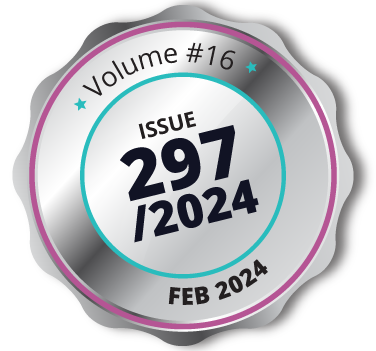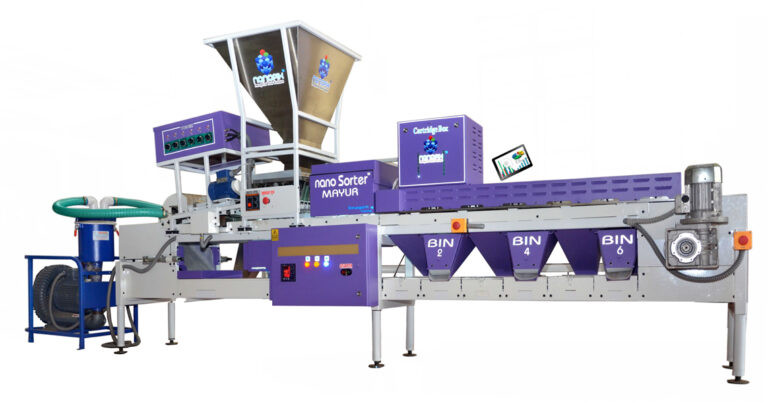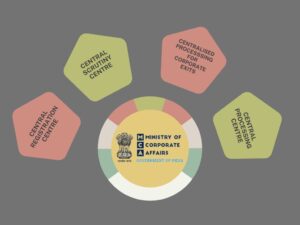
Volume #16 | IssueNo. 297/2024 | February 2024

Luck favours the prepared!
Expect the unexpected ! I didn’t expect an IIM professor teaching entrepreneurship to focus on “Serendipity” while addressing a bunch of spirited women entrepreneurs. Occasion was the valedictory of #NSRCEL’s WSP 4.0 (Women Startup Programme) at #IIM Bangalore, a CSR initiative of the Kotak Mahindra Bank. As a legal mentor to the participants, as I sat there in all eagerness to hear Prof. Suresh Bhagavatula deliver his keynote, I expected a serious talk on some new age fundas and theories, practical marketing tips and deep insights into entrepreneurship. Instead, what I heard was his short, interesting and intriguing talk on the role of ‘Serendipity’ in life in general and entrepreneurship in particular. It was easy on the ears, delightfully anecdotal and left us all thinking how beneficial it is If we embrace openness in our lives. If we are not afraid of taking random chances, trying out new ideas, interacting with new people and just going with the flow, unplanned and untethered. If we are not afraid of failing and learning from our failures !!
Prof. Suresh based his talk on Richard Weisman’s book “The Luck Factor” which presents traits of hundreds of people interviewed by the psychology professor cum author. Luck is not just chance or destiny. It is your actions and mindset that can increase your chances of being lucky. He found the following traits in the so-called lucky people :
- They are resilient – they bounce back and never give up.
- They grab opportunities – New or even random experiences introduce the potential for new opportunities.
- They go by their intuition – unlucky people are anxious and indecisive. Lucky people listen to their gut and open themselves to new opportunities.
- They are optimists – even in unlucky situations, they find something positive and productive.
Professor delivered a simple yet profound message to the entrepreneurs – Believe in Serendipity. Increase the ‘luck factor’ surface area of opportunities. This is what one of our clients, Nanopix Integrated Software Solutions did years ago. They began with image processing services to automotive companies, that needed cameras to inspect the dimensions of components such as nuts and bolts. But a chance meeting with a castor oil supplier from Hubli, a city in northern Karnataka, inspired Sasisekar Krish, Founder to write a program that could grade cashew nuts through colour and size. All because the supplier mistook the automotive “nuts” to mean cashew nuts, and connected him to a local exporter. Sasi welcomed the ‘lucky misunderstanding’ with a bold innovation and together with his dynamic spouse Suchitra, has built a successful cashew grading and sorting machinery manufacturing business with 100+ employees and multiple patented products from a tier 2 city like Hubli. As they say, “Fortune favours the brave” !

While on the topic of Serendipity, how can I not refer to the genesis of the world renowned IISc in Bangalore ? It was of course thanks to a chance meeting on a voyage, between Jamsetji Tata, the doyen of Indian industry and Swami Vivekananda, the patriotic Indian ascetic who inspired with a ‘awake, arise’ call that the idea of setting up a research institute of global standards on Indian soil took birth. Read the transcript of Tata’s letter to Swamiji OR listen to the audio on www.tata.com
Some of the diverse examples of Serendipity are the discovery of pencilin drug, the invention of 3M post-it-pad when the inventor was looking to prepare stronger glue, accidental preparation of chocolate chip cookies, Kellogg’s corn flakes from a batch of flaked wheat berries, quick concoction of the famous Mysore Pak (dessert) by the chief chef, Kakasura Madappa for the King of Mysore Krishnaraja Wodeyar, the invention of Rava Idli during the World War 2 scarcity of rice by the Founder of the famous eatery MTR in Bangalore……the list can go on.
As an entrepreneur you may increase the ‘surface area of opportunities’ through luck or chance but I bet not for compliances. You need to be informed to act. We present the 297th issue of Samhita, our monthly newsletter which summarises the regulatory and policy changes from various ministries announced during February, 2024. This time you will find aplenty from IBBI on liquidation, our hero story on the paradigm shift in ROC functioning with most of their functions now centralised in NCR area and the big ticket liberalisation through FDI policy in space sector. And then there is the monthly reminder for statutory compliances which you can sync up with your calendar.
For any previous issues of Samhita and the readers’ feedback, please visit sharadasc.com
Happy Reading
S.C. Sharada
MCA UPDATE
Centralised Processing of eforms under the Companies Act, 2013
The Ministry of Corporate Affairs has been at the forefront of ensuring Ease of Doing Business (EODB) through its various initiatives. Setting up of Central Registration Centre (CRC) in 2016 for centralized processing of incorporation forms was one major move towards the mission of EODB. Since then, name approvals and incorporations have been taking place in a timebound manner except for the recent interruptions owing to migration of the portal to a new version. To provide fast paced exit to solvent or non-operational corporates, the MCA established Centralised Processing for Accelerated Corporate Exit (C-PACE) in May 2023. This has resulted in processing of forms for strike off of companies in a time bound manner with average time of 4 months. With a view to extend the benefits of timely and faceless processing of forms to corporates, MCA has established Central Processing Centre (CPC) for processing of all e-forms under the Companies Act, 2013.
Couple of notifications paving the way for centralized processing of various e-forms filed under the Companies Act, 2013 have been notified. Highlights of the same are as follows:

- February 02, 2024 – all e-forms shall be processed by the Central Processing Centre (CPC), Manesar, Haryana w.e.f February 06, 2024. The jurisdictional Registrar within whose jurisdiction the registered office of the company is situated shall continue to have jurisdiction over the forms processed by CPC.
- February 14, 2024 – specified 12 e-forms that will be processed by the Registrar of CPC w.e.f February 16, 2024. The rights available to jurisdictional Registrar under sub rule (2) to (5) of Rule 10 of the Companies (Registration Offices and Fees) Rules, 2014 are made available to Registrar of CPC as well. These include right to call for further information, informing about defects in the e-form, permitting time to re-submit for rectification of defects etc.
- Press release dated February 16, 2024 – rest of the e-forms other than the 12 covered above, will also be gradually processed by CPC w.e.f April 01, 2024. At later stage, it is also proposed to centralize the processing of LLP Forms.
Owing to complete centralization of MCA’s functions, it is CPC (processing of forms), CRC (Central Registration Centre for Incorporation) and CSC (Central Scrutiny Centre) all the way.
With this paradigm shift, processing of all forms has moved out of jurisdictional ROCs to the CPCs. Soon e-adjudication by ROCs will become a reality.
Open MCA notification dated February 02, 2024
Open MCA notification dated February 14, 2024
Open MCA Press Release dated February 16, 2024
MCA Updates
MCA vide General Circular dated February 19, 2024 has notified the deployment of Change Request Form (CRF) in MCA V3. This form can be used for Master Data correction and complying with certain directions of Courts/Tribunals which cannot be catered through existing forms or functionalities of MCA 21 Services or Back Office level at ROCs. The form shall be processed by ROCs within 3 days of filing after which it shall be forwarded to Joint Director (e-governance cell) who shall decide the matter within 7 days. It may be noted that this is not a substitute for any reporting under the Companies Act, 2013 or LLP Act, 2008.
Revised Secretarial Standard-1 on Board Meetings and Revised Secretarial Standard -2 on General Meetings notified under Section 118 of the Companies Act, 2013 shall be effective from April 01, 2024. The language changes are meant to align with the Exemption notification of 2015, Amendment Act of 2017 and 2020 notification. A few of them are highlighted below:
Secretarial Standards-1
- OPC and Section 8 Companies are exempt from complying with the SS – 1. However, such exemption is available to Section 8 Companies only if they have not defaulted in filing Financial Statements or Annual Return. Exemption notification dated 13th June 2017
- Directors can participate through electronic mode for restricted items if there is physical quorum present in the meeting. This is in line with the 2nd proviso inserted under Section 173(2). However, pursuant to the amendments, currently there are no restricted items prescribed under the rules.
- Independent Directors shall hold at least one Meeting in a financial year without attendance of Non-Independent Directors. The word ‘calendar year’ has been replaced with the word ‘financial year’ in line with Schedule IV of the Act.
- For Quorum at Meetings of the Board in case of Private Companies, the interested Director shall also be reckoned for Quorum and entitled to participate in respect of such item after disclosure of his interest.
- Earlier, the exemption was provided w.r.t participation in the meeting by an interested director, after disclosure of interest.
- Proof of sending and delivery of the draft of the Resolution and the necessary papers shall be maintained by the company for such period as decided by the Board, which shall not be less than three years from the date of the Meeting circulation of such Resolution. Since there is no ‘Meeting’ conducted in resolutions passed by circulation, the proposed amendment is suggested for better clarity and uniformity in practice.
Secretarial Standards-2
- Conditional exemption from compliance of SS-2 for Section 8 Companies as introduced in SS-1 i.e only if they have not defaulted in filing Financial Statements or Annual Return.
- Reference to ratification of appointment of auditors omitted from the definition of “Ordinary Business”. This is in line with the omission of the provision relating to ratification under Section 139 of the Companies Act, 2013 effective since May 07, 2018.
- Extra-Ordinary General Meetings may be held at any place within India. However, in the case of a wholly owned subsidiary of a company incorporated outside India, EGMs may be held outside India.
This has been added in line with Section 100 of the Act and to provide better clarity on the venue of EGMs for foreign subsidiaries.
- In a company where 90% or more of the members (in numbers) are relatives of promoters or related parties, a member who is a related party can vote on a resolution for the approval of any contract or arrangement in which such member is a related party.
- For wholly owned subsidiaries, the resolution passed by the holding company is sufficient for the purpose of entering into the related party transactions between wholly owned subsidiary and holding company. These insertions are in line with the provisions under Section 188 of the Act.
- A member who is a related party can vote on resolutions related to contracts entered into by the government company with another Government company or with the central government, the State Government, or any combination thereof. Insertions are in line with the MCA’s exemption notifications June 05, 2015 and March 02, 2020.
MCA had earlier released notifications for compliance of Beneficial Interest and Significant Beneficial Ownership by LLPs in October 2023 and November 2023 respectively. However, relevant forms notified under the said notifications are not yet live on the portal. In view of the same, the MCA vide General Circular dated February 07, 2024 has informed that Form LLP BEN-2 and Form LLP 4D will be made available in MCA V3 portal w.e.f April 15, 2024. Accordingly, LLPs will be able to file such forms without payment of additional fees upto May 15, 2024.
Others
In our 295th Issue of Samhita, we carried an update on the Government of Karnataka’s Bill to amend the Karnataka Stamp Act, 1957. The Bill has received the assent of the Governor on February 03, 2024. Accordingly, stakeholders concerned will be required to follow the amended rates henceforth. Refer our 295th Issue to view the highlights.
RBI Update
As per the existing FDI policy, Government approval is mandatory for any FDI in the ‘Satellites-Establishment and Operations’ sector. Vide Press Release dated February 21, 2024, it has been informed that the entry routes for various activities in Space sector will be amended in the FDI policy as follows:
- Upto 74% under Automatic route: Satellites-Manufacturing & Operation, Satellite Data Products and Ground Segment & User Segment. Beyond 74% these activities are under government route.
- Upto 49% under Automatic route: Launch Vehicles and associated systems or subsystems, Creation of Spaceports for launching and receiving Spacecraft. Beyond 49% these activities are under government route.
- Upto 100% under Automatic route: Manufacturing of components and systems/ sub-systems for satellites, ground segment and user segment.
IBBI Updates
The Insolvency and Bankruptcy Board of India (“IBBI”) has notified amendments to the Insolvency and Bankruptcy Board of India (Voluntary Liquidation Process) Regulations, 2017 w.e.f January 31, 2024. These amendments seek to foster transparency, accountability, timely resolution and managing the distribution of funds more efficiently.
Highlights of the amendments are as follows:
- Directors initiating voluntary liquidation (“VL”) to declare through affidavit that enough provisions have been made for all pending legal proceedings or assessments before statutory authorities, and pending litigations disclosed in the document accompanying affidavit.
- If the liquidator fails to complete liquidation within the specified timeframe (270 days/90 days), he must hold meetings with contributories of the corporate person within 15 days of said timeframe, providing status reports and reasons for delays, if any till the submission of application for dissolution. Such meetings shall be held after every 270/90 days, as the case may be.
- Stakeholders can now request for withdrawal of amount from the Corporate Voluntary Liquidation Account after the final report submission but before dissolution, by submitting Form-I to the Liquidator. The liquidators have been tasked with verification and processing of such claims for onward request to IBBI.
- After dissolution of the corporate person, stakeholders can still apply for withdrawal of sum placed into the Corporate Voluntary Liquidation Account by submitting Form-I to IBBI.
- Any person other than the stakeholder, who claims to be entitled to amount deposited in the Corporate Voluntary Liquidation Account shall submit evidence for such claim to the Liquidator or IBBI, as the case may be.
Open IBBI (Voluntary Liquidation Process) Amendment Regulations, 2024
Vide Circular dated February 13, 2024, IBBI (“Board”) has directed Voluntary Liquidators to submit copies of the following documents to the Board via email at liqvol@ibbi.gov.in
- Form H (Compliance Certificate under Regulation 38(3) of VL)
- Final report filed before the Adjudicating Authority in accordance with Regulation 38 of the Insolvency and Bankruptcy Board Of India (Voluntary Liquidation) Regulations, 2017, and
- Dissolution order
Section 227 of the IBC Code read with the Insolvency and Bankruptcy (Insolvency and Liquidation Proceedings of Financial Service Providers and Application to Adjudicating Authority) Rules, 2019, permits Financial Service Providers (FSPs) notified by the Central Government, with prior permission from the appropriate regulator, to undergo Voluntary Liquidation (“VL”).
It has been observed that VL of FSPs have been initiated without notification or prior approval from regulator concerned. Therefore, liquidators of FSPs have been directed to declare whether the FSPs falls under the category notified by the Central Government under Section 277 of the Code and whether they have obtained prior permission from the appropriate regulator.
Regulation 39 of VL Regulations, outlines the procedure for managing unclaimed deposits and undistributed proceeds during voluntary liquidation. Liquidators are required to deposit such amounts into the Corporate Voluntary Liquidation Account and inform the IBBI regarding stakeholders entitled to these funds using Form-G.
IBBI vide circular dated February 13, 2024 provides an Annexure for submitting Request For Withdrawal, to the Board by the Voluntary Liquidator and release of such amount for onward distribution to the stakeholders.
IBBI has amended the Insolvency and Bankruptcy Board of India (Bankruptcy Process for Personal Guarantors to Corporate Debtors) Regulations, 2019 w.e.f January 31, 2024 as follows:
- Explanation under Regulation 4 pertaining to Eligibility of Resolution Professional (“RP”) has been modified to state that a person shall be considered independent of the guarantor if he is not an associate of the guarantor and is not a related party of the corporate debtor.
- “has not acted or is not acting as interim resolution professional, resolution professional or liquidator in respect of the corporate debtor” has been omitted from above Explanation, thereby making such person independent of the guarantor and eligible for appointment as RP.
- Regulation 17A has been inserted for Meeting of Creditors. It mandates the Resolution Professional to place the repayment plan to creditors for review as per Section 105 the IBC Code. If no repayment plan is received within the stipulated timeframe as per Section 106 of the Code, the resolution professional must inform the same in a meeting of creditors.
IBBI vide notification dated January 31, 2024 has notified amendments to Insolvency and Bankruptcy Board of India (Bankruptcy Process for Personal Guarantors to Corporate Debtors) Regulations, 2019 as follows:
- Explanation to Regulation 4 pertaining to Eligibility of Resolution Professional has been modified to state that a person shall be considered independent of the guarantor if he is not an associate of the guarantor and is not a related party of the corporate debtor.
- Further, the restriction for appointment of the following persons as bankruptcy trustee or professionals under Regulation 3 and 5 respectively, has been omitted:
- Insolvency professional who has acted or is acting as an interim resolution professional;
- Resolution professional; and
- Liquidator for a corporate debtor
In terms of Section 99 of the IBC Code, the Resolution Professional (“RPs”) are required to examine the application filed by the Debtor or Creditor and submit a report to the Adjudicating Authority, recommending approval or rejection of the application. A copy of the report is also required to be shared to Debtors or Creditors as the case may be as per Section 99(10) of the Code.
It has been noted that in some cases, RPs have not shared the report with both debtor and creditor, resulting in unequal access to information. Vide Circular dated February 12, 2024 the IBBI has advised the RPs to mandatorily provide a copy of the report to both debtor and creditor in all cases for promoting transparency and enabling informed decision-making.
Vide notification dated February 12, 2024 IBBI has notified significant amendments to the Insolvency and Bankruptcy Board of India (Liquidation Process) Regulations, 2016. These amendments are aimed at enhancing procedural clarity, efficacy, accountability and boosting stakeholders’ confidence within the liquidation proceedings. Mandating liquidators to convene Stakeholders’ Consultation Committee (“SCC”) meetings with maximum interval of 30 days for timely decisions, presentation of comprehensive progress report on the liquidation process at SCC meetings etc are some of the major changes. Highlights of the same are enclosed for reference.
Open Highlights-IBBI Liquidation Process Amendments
Open IBBI notification dated February 12, 2024
IT Update
Hon’ble Finance Minister in her Budget speech had announced remission and extinguishment of certain outstanding direct tax demands up to specific monetary limits across various assessment years until 2015-16. Vide order dated February 13, 2024 the remission has been notified with an overall cap of Rs. 1,00,000 per taxpayer. TDS/TCS demands will not be covered under this order.
GST Update
GSTN has announced the launch of the revamped e-invoice master information portal https://einvoice.gst.gov.in .This enhancement is part of ongoing efforts to further improve taxpayer services. New features of the revamped E-Invoice Master Information Portal are detailed in the advisory.
March 2024

Quote of the day
“Serendipity will take you beyond the currents of what is familiar. Invite it. Watch for it. Allow it.”
- Jeanne McElvaney
Disclaimer: The contents of this Newsletter are only a summary and has not dealt with any issue in detail. Any action taken or proposed to be taken must be in consultation with professionals and not merely based on the articles / news updates. S. C. Sharada & Associates disclaims all liability on action taken without professional advice.

